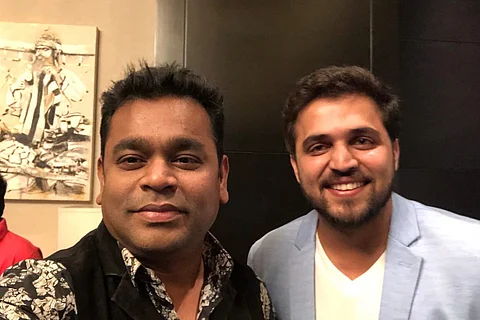

Singer and now music composer Nakul Abhayankar is excited about all that life throws at him. An engineering graduate who gave up a full-time IT job to pursue music professionally, Nakul had his big break when he sang for AR Rahman the first time in 2018. Nakul was about five years into being a full-time musician when he sang ‘CEO in the House’ in Vijay’s Sarkar. The singer has collaborated with ARR once again in the recent ‘Thumbi Thullal’ from Cobra. The festive duet, which he has sung along with Shreya Ghoshal, released a few weeks ago.
“Rahman sir’s magic is very evident. There is so much soul in the song, it is a genuine, straight-from-the-heart melody,” Nakul tells TNM. “It is a new age track with a tinge of classical Indian music and he is the master of doing such music, right from Roja, where he was able to mash up and seamlessly blend two different genres,” he adds.
In this interview, the musician who is currently working on Daish Sait’s upcoming web series Humble Politician Nograj, and on another Kannada film as a composer, discusses his journey so far, the challenges of being a young music composer, his flair for languages and his dream for his music.
My life has surely been interesting (laughs). Right from engineering to IT, then to quitting my job and to pursuing music for three years at KM conservatory.
When I decided to take up music full-time in 2013, the industry had changed. There was no playback as a profession. Everyone had to do everything. India has a dynamic market and I believe a person will have to pick up everything to survive here. People like to hire musicians who can do more than just one thing. From the beginning, I had a lot of interest in production, programming, and composing in addition to singing. I didn't want to restrict myself.
I wanted to be called a complete musician, right from knowing how to score for a film and composing to the mix-master stage. That vision inspired me to learn everything.
I think I can survive anywhere I go. I know about seven to eight languages. Marathi is my mother tongue. I know Kannada and Tulu having grown up in Karnataka. I also know Telugu and a little bit of Urdu. Tamil was difficult when I began but now I’ve picked up the language pretty well. I’d like to learn Bengali and Malayalam and then I can say I’m all sorted (laughs). Although, I found Malayalam to be quite a tricky language.
Both my grandfathers are no more but both had deep rooted musical backgrounds. My maternal grandfather was a Haridas and my paternal grandfather was a Yakshagana. Both were involved in the musical form of storytelling. I'm lucky to have a musical family.
My brother too is musically inclined, in fact, he wanted to pursue it full-time at one point but was unable to do so. So, I reach out to him for feedback. My wife too is a musician and she is very honest with her opinion. I'm thankful that I can depend on them for honest feedback.
I don't follow reality TV shows, I had a good chunk of it in my life and I’m through with it. But reality shows are a great stage for talent hunt. We wouldn't have heard of such talents otherwise. But it can also work both ways. Some might begin with confidence but may not be able to crack the industry. Then there are those who think they can't do anything but might become big on a reality show.
In my case, reality shows gave me a push and showed me my own capabilities. It gave me a direction in music.
It was my longtime dream to work with AR Rahman and Shankar Mahadevan. One has happened and I hope the other too happens soon. But generally, I’d like to work with everyone.
I think both fields have challenges. I have to keep training myself in compositions and in singing. As a composer, I have to work on compositions daily and the same goes for my training in singing. In that sense, Hindustani helps me greatly. Hindustani music gives me one platform to exercise both — singing and composing. It is constantly about improvising and I have to think a lot about something new that I can come up with. Also, it is a dream for me to be able to give a full concern in Hindustani, at least in 10 years down the line.
But as a young composer, I feel the budget issues are a big challenge. Sometimes, we may not have the freedom to record the instruments we want or with the artist whom we want. There is this fight to be able to get what we want and at the same time work around the budget constraints. Now that I have my own profile, people are starting to trust my music and I can see that things are changing.
I haven't dug a lot into indie artists yet, but I do like a few bands and musicians like Masala Coffee and Raghu Dixit. Also, I’ve been talking to a few friends who are playback singers to work on a few songs, approach a music label and see if we can take it further. I’m definitely interested in collaborating with more artists and making independent music.